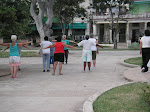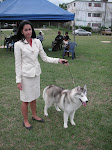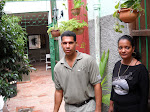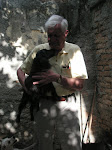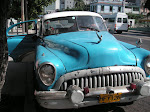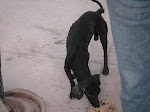Gift Baskets
Some people live their whole lives without finding a stray
cat or dog on the front porch. Those
people aren't usually known as animal lovers.
I think it is impossible to be known as an animal lover in one's area
without someone eventually deciding to leave an animal at your door
clandestinely.
Granted such secretive "gifts may be motivated by a
desire to help a homeless animal, but they are also a burden on the recipient,
no matter how much he or she loves animals.
Most animal lovers have more than one companion animal—sometimes a few
or several. I'm not talking here about
"hoarders" who are mentally ill and have far too many animals. I'm talking about normal people with a
special love for dogs and/or cats.
People like my dear departed mother-in-law and father-in-law who loved
all animals and instilled that love into their daughter, my wife, Charlene.
Mary, my mother-in-law, usually had one dog and a few
cats. She and her husband, Ben, cared
for all their animals, spent plenty of time with them, and often talked about
them with friends. But Mary and Ben were
often victimized by others who might dump a cat or a few new kittens at their
house. Each time they found a box or
basket at the back door, they had to care for the new arrival(s), feed them,
and try to find a friend who might want to adopt it. That meant they usually had a few more
animals than they could reasonably support.
In our own case, although I can't prove they were dumped,
over the years we have encountered several cats hanging around our house. This happens with a frequency that leads me
to suspect some of them may have been unrequested midnight deliveries. As a result, we have averaged about 6 cats in
our house over the 24 years we have lived here.
It was the same at our farm before we moved here, but the number of
strays in that area was always large.
What's the alternative if you find a dog or cat? Well, first decide if you have room in your
life for a new companion. Do you have
any friends who might like to adopt a lifelong pal? Also, consider a local shelter or
refuge. Yes they are usually full, and
some must euthanize animals to control the number they keep, but, assuming the
shelter practices humane euthanasia, that is neither cruel nor unfair in this imperfect
world. What does seem unfair is to leave
an animal at someone's door just because that person loves animals.
I'm saying that when you encounter a homeless animal you
should do everything possible to get it into a caring home. Charlene's mantra is "Never be too busy
to help an animal in distress." And
she lives by that Commandment without exception. But beyond animals found along
the roads or in the occasional picture of a rescued dog in foster care that we
fall in love with, we really don't need surreptitious additions to our
menagerie.
Every animal adopted by loving, sensible people is one less
animal at risk of injury, sickness, or starvation.
Les Inglis










































































